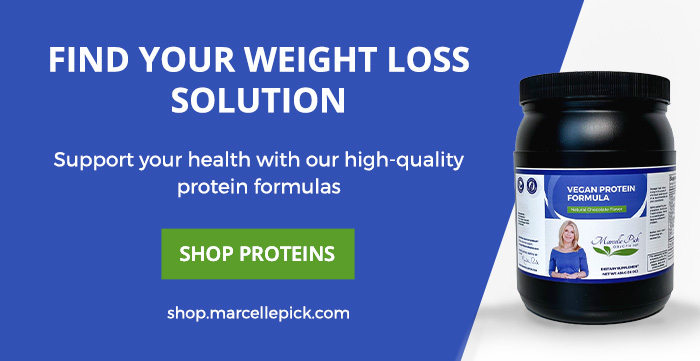Updated: February, 1 2026
- Severely restricting food intake doesn’t usually result in sustainable weight loss.
- Eating adequate amounts of protein is essential for weight loss.
- Protein regulates hormones, decreases appetite, and helps burn calories.
- Protein bars are not the answer; whole foods are the best choice.
- Boost protein intake through the healthy proteins listed below.
“I don’t understand it. I don’t eat sugar, I limit my carbs, I barely eat at all. I’m so hungry all the time, but still I can’t even lose a pound or two? What’s going on?” That’s what Jenny said in our recent conversation. My response shocked her; I told her she wasn’t eating enough. The actual problem was even more specific – she needed to eat more protein! Without proper amounts of protein, it’s exceedingly difficult to lose weight!
There’s been a lot of talk recently about the new dietary guidelines. They aren’t perfect, but I do agree with this: protein should be a priority! A well balanced diet that includes complex carbs, healthy fat and protein is essential for good health. But protein, more than any other nutrient, is critical for weight loss. That’s because it boosts metabolism, reduces appetite and impacts many different hormones that help regulate weight.
Eating enough protein will impact more than the number on the scale. You know those trouble spots that never seem to improve no matter how much weight you lose – like stubborn belly fat? Yep, protein will help you get rid of that too. Let’s explore how protein works in your body to help you lose weight without feeling hungry, get the body you desire, and celebrate the reflection you see in the mirror.
How Protein Impacts Weight Loss
There are many different mechanisms in the body impacted by protein consumption that can aid in achieving your weight loss goals, including hormone regulation, burning calories, and decreasing appetite.
Research has determined that regulation of weight starts in the hypothalamus, an area of your brain. This area receives critical messages from various hormones that shift depending on food consumption. These messages let the brain decide how much and when you should be eating. When you eat a diet high in quality protein, levels of hormones that reduce your appetite, including GLP-1, peptide YY and cholecystokinin, are increased. At the same time, levels of ghrelin, a hormone that reduces hunger, increase. Simply put, your brain gets the message that you are less hungry and more satisfied when you eat adequate amounts of protein.
Digestion is hard work, and your body must use calories to complete the process of breaking down and metabolizing the food. The number of calories burned during digestion is called the thermic effect of food. Between 5 and 10 percent of calories from carbs and 0 to 3 percent of calories from fat are used during digestion. The percentage of calories from protein used in digestion is much higher – between 20-30%. That is significantly more of the calories consumed that are used for a basic body function! But what does that mean? Let’s look at it this way. If you eat 100 calories from fat, you’ll burn 0 to 3 calories during digestion. For carbs, that number becomes 5 to 10 calories. But from protein, you’ll use up to 30 calories just to digest and metabolize the food.
Higher intake of protein also seems to boost metabolism (meaning you are burning more calories in general – even while you sleep). In fact, research has shown that you can burn up to 100 more calories per day when protein intake is high. One study found that eating a surplus of calories on a high protein diet burned 260 more calories per day. Now I don’t encourage overeating (you don’t want to get used to ignoring body cues) but this is just one more piece of evidence that shows you don’t have to be hungry to lose weight!
And speaking of not being hungry, high protein intake can also decrease your appetite, which prompts you to eat less and take in less calories. All this without counting calories. One study showed that eating 30% of calories from protein caused an automatic drop of more than 400 calories per day!
And there’s more good news; in addition to decreasing overall appetite, studies have shown that high protein intake can eliminate cravings and late night snacking too! Snacking in the evening is one of the biggest hurdles for many of my clients to overcome. Many of them tell me they’re fine all day long, but when the sun goes down, they just can’t stay out of the kitchen. This is likely the result of both habit and hunger. Evening snacking is best avoided because you’re piling on more calories and then heading to bed. Late night eating can also make sleeping more difficult – and sleep is another key factor in maintaining a healthy weight.
Now let’s talk about belly fat. Research has consistently shown an association between high protein intake and decreased fat in the abdominal region. So if you’ve been trying for years to achieve a flatter belly, boosting the amount of protein you eat just might do the trick.
Protein can also help you lose what you actually want to lose: fat, not muscle! AS you lose weight, your metabolic rate can decrease. Your body may think you are headed into a famine and kick into starvation mode, holding on to any calories it can. Protein can help reduce muscle loss which lets your body know you aren’t actually starving, so you can maintain a higher metabolic rate. Add some strength training to the regimen and you’ll look fit and lean, not flabby, as you lose body fat.
That’s a lot of great reasons to eat more protein when trying to lose weight, and here’s maybe the best reason of all: eating more protein can also help you keep the weight off! One study showed that a moderate boost in protein helped 50% of participants avoid regaining the weight after weight loss! Since it’s very common to gain back all you lose (and sometimes more) after substantial weight loss, this is important information!
How much Protein should you Eat Daily?
Recommendations over how much protein is optimal vary, and are typically rather modest. The new Dietary Guidelines for Americans recommend 1.2-1.6 grams of protein per kg of body weight. This is more than the previous guidelines, and a nice step in the right direction. But we are all unique individuals, so the ideal amount for you depends on a range of factors, including activity level, age, muscle mass and more. To lose weight (rather than simply avoid protein deficiency), higher intake is likely required.
Research on the connection between protein and weight loss focuses on a percentage of calories from protein. Consuming 30% of daily calories in protein seems to be the most effective target.
It’s not enough to just eat protein – you have to pay attention to the timing and quality of the proteins as well. So many processed foods are adding protein, but that’s not the right solution! You should get your protein from whole foods.. It’s best to spread protein consumption throughout the day, including some protein with every meal and snack.
Animal protein typically gives you the right amount of essential amino acids you need. People who eat a vegetarian or vegan diet may need to be more conscious of their protein choices to be sure they get all the required nutrients.
Add more protein to your diet with these foods
Now that you understand how important protein is for both good health and weight loss, and you know how much protein to include in your diet, you may be wondering what the best sources of protein are.
For people who eat animal products, as I said, it’s a bit easier to add protein to your plate. The following are all great sources of protein:
- High quality, all natural chicken, turkey, pork, lean beef, lamb, bison, and other meats are all great sources of protein.
- Salmon, trout, haddock, sardines and other fish
- Chicken, duck, and other eggs
- Milk, yogurt, cheese, cottage cheese and other dairy products
For those following plant based diets, it can be more challenging, but certainly isn’t impossible. Some great options include:
- Beans, chickpeas, lentils and other legumes
- Almonds, cashews, and other nuts
- Pumpkin, hemp and other seeds
- Grains like oats, quinoa and amaranth
- Broccoli, spinach, Brussels sprouts, asparagus, artichokes, potatoes, and sweet potatoes
- Tofu, tempeh and edamame
- Nutritional Yeast
- Spelt and teff
Even for those who do eat meat, if adding extra protein to the diet it’s important to remember that animal products also have more saturated fats and cholesterol. Consuming too much of these can put you at higher risk of heart disease, so it’s best to select plant based products if you’re going heavy on the protein.
It’s also important to remember that for weight loss, you want to avoid consuming too many calories that will just get stored as fat. A high protein diet can make this easier, since you are likely to feel less hungry and more satisfied, so you’ll eat less without even thinking about it.
Boosting protein can be a delicious, easy way to lose weight
Jenny listened carefully as I explained how important protein is, and how it could help her meet her weight loss goals. Together, we created a meal plan that included a lot more protein. When I called her to follow up a couple of weeks later, she’d lost four pounds! Finally, her body didn’t think it was starving. She felt full, satisfied, and far more healthy already.
Jenny was so grateful to know that she didn’t have to starve herself to lose weight. And you don’t have to either! Try adding a little more protein to your diet and see what happens. I think you’ll be as pleasantly surprised as Jenny was!









